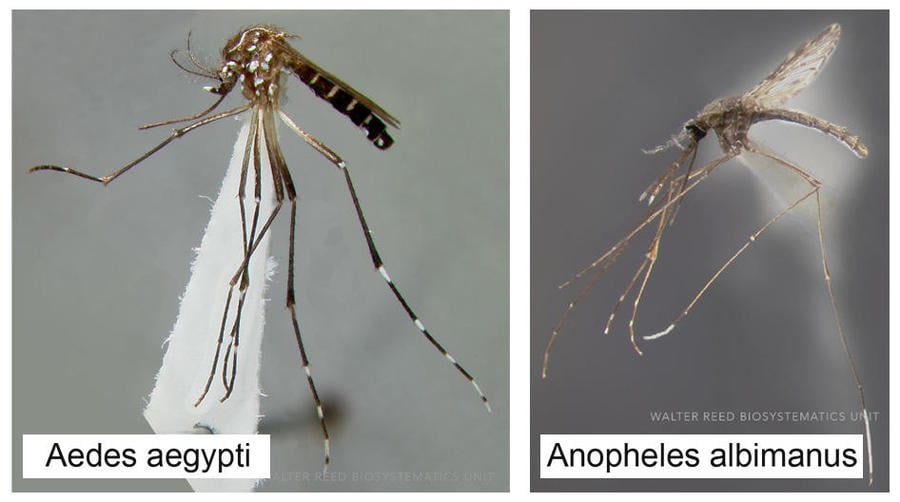
Did Bill Gates hatch a convoluted plan to create a demand for anti-malaria drugs he funded by also funding malaria-fighting programs while developing a means to introduce malaria to the United States through genetically modified mosquitoes? No, that's not true: Genetically modified male mosquitoes being tested in the U.S. - the type that don't spread malaria and also don't bite - were not funded by the Bill & Melinda Gates Foundation. The test mosquitoes are of the species that can spread Zika virus, West Nile Virus and yellow fever, although they are modified to prevent the spread of those diseases.
An article (archived here) making this claim was published by American Faith on June 28, 2023, titled "Bill Gates Develops Malaria Drugs, Then Releases Genetically Modified Mosquitoes into the U.S.--Now Texas and Florida Are Detecting the Disease, Gates-Funded CDC Is Recommending Those Drugs" The article is presented as 20 bullet points, many of which contain hyperlinks to reference materials. It opened:
- The last time the United States saw cases of malaria was when seven people got sick in Palm Beach County in July-August 2003, according to the U.S. Centers for Disease Control and Prevention (CDC).
- In 2007, Bill and Melinda Gates began targeting malaria research.
- In 2014, the Gates' announced their decision to increase The Bill and Melinda Gates Foundation's malaria budget by 30%.
This is how the article appeared at the time of writing:
(Image source: American Faith screenshot taken on Thu Jun 29 20:16:34 2023 UTC)
The article's design misleads by offering links to quality sources, but leads the reader toward a deceptively engineered conclusion. Many of the bullet points are true, but with crucial details omitted. The Bill & Melinda Gates Foundation has made malaria eradication a priority. The website explains their strategy, summarized here:
Malaria eradication is a top priority of the foundation. For two decades, we have devoted resources and expertise to a relentless pursuit of malaria eradication, and we have continuously adapted our approach to achieve the greatest possible impact, in partnership with the global community. We support efforts to:
- Reduce the burden of malaria by expanding the use of effective existing tools, including preventive medication and case management, and improving disease surveillance and data for decision-making high-burden settings
- Accelerate progress toward eradication by investing in next-generation surveillance systems, elimination in regions where drug-resistant malaria has emerged, and research and development efforts
- Get ahead of resistance by eliminating falciparum malaria--the type that causes the most severe cases and deaths--in the Greater Mekong Subregion, developing a robust pipeline of new treatments, and analyzing disease and mosquito genetic data to quickly respond to threats
Two species of mosquitoes
Malaria is spread through a parasite acquired through the bite of a female Anopheles mosquito. It's not spread by the Aedes aegypti, a species of mosquito that spreads other diseases such as the Zika virus, West Nile Virus and yellow fever. The biotechnology company Oxitec Ltd. developed a genetically modified Aedes aegypti mosquito to reduce wild populations of that species and was granted an Environmental Protection Agency (EPA) experimental use permit to conduct trials in Monroe County, Florida, and Harris County, Texas.
At this time, no trials have been conducted in Texas. The released Aedes aegypti mosquitoes are genetically self-limiting -- only male mosquitoes were released in Florida -- and male mosquitoes do not bite. A spokesperson for Oxitec told Lead Stories that no U.S.-based work by Oxitec is funded by the Bill & Melinda Gates Foundation.
The two mosquitoes specific to this fact check are pictured below. The Walter Reed Biosystematics Unit, which is a partnership between the Walter Reed Army Institute of Research and the Smithsonian Institution, has a catalog of species profiles that describe characteristics, distribution and pathogens they may spread when the female mosquitoes bite humans or other animals.
- Aedes aegypti (pictured below left) has over 50 associated pathogens listed in the species profile, including dengue, Zika, West Nile and yellow fever virus.
- Anopheles albimanus (pictured below right) has only seven associated pathogens listed, but among them are two protozoan parasites that cause malaria, Plasmodium falciparum and Plasmodium vivax.
(Source: Lead Stories composite image with wrbu.si.edu screenshots (here and here) taken on Fri Jun 30 14:58:18 2023 UTC)
Oxitec and the Friendly™ Mosquitoes
The U.K.-based biotechnology company Oxitec has been working to develop "Friendly™ Mosquitoes," describing the biological method of suppressing wild mosquito populations this way:
... through the release of male Friendly™ Mosquitoes, which do not bite and do not transmit diseases. When released, Friendly™ males search for wild females to mate and their offspring inherit a self-limiting gene that causes either all progeny or just the female progeny to die before reaching adulthood, based on whether the mosquito contains 1st generation or 2nd generation technology, respectively. Friendly™ Mosquitoes offspring also inherit a fluorescent marker that allows tracking and monitoring at a level never before achieved, making the assessment of effectiveness more accurate throughout the whole Friendly™ Mosquitoes deployment program. Unlike other approaches, Friendly™ Mosquitoes do not persist in the environment or leave any ecological footprint.
Oxitec received an EPA experimental use permit to "test efficacy of OX5034 Aedes aegypti mosquitoes expressing tetracycline Trans-Activator Variant (tTAV-OX5034) protein for control of wild Aedes aegypti mosquitoes," in Florida and Texas effective from April 30, 2020, to April 30, 2022 (this has been extended). At this time there have been no trials conducted in Texas. The mosquitoes released in Vaca Key, Florida, were only males -- incapable of biting, and they are Aedes aegypti mosquitoes, which are not the species associated with spreading malaria.
Oxitec and the Bill & Melinda Gates Foundation
In 2005 the Gates Foundation announced it was committing $258.3 million to fund a variety of international malaria research and development programs. At the Malaria Summit London 2018 on April 18, 2018, the Gates Foundation pledged an additional $1 billion through 2023 toward research and development to end malaria.
On October 18, 2018, Oxitec published a press release announcing a collaboration with the Bill & Melinda Gates Foundation. The Gates Foundation also maintains a database of committed grants. A June 25, 2018, article in Philanthropy News Digest reported that the Gates Foundation granted $4.1 million to Oxitec to fund the development of another strain of self-limiting mosquito. This would target populations of the variety of mosquito that can transmit malaria, the Anopheles mosquito.
Lead Stories reached out to the Oxitec press office with some questions about the claims in the American Faith article. On June 29, 2023, we received a reply from Joshua Van Raalte with the communications agency Brazil. His answer offers important contradiction of the conspiracy claims about Florida and Texas mosquitoes:
No US-based work by Oxitec is funded by the Bill & Melinda Gates Foundation. Also Oxitec has no malaria-based work in the United States.Oxitec's work in Florida is only with the Aedes aegypti - the mosquito species which carries dengue fever, chikungunya, Zika fever and yellow fever - not malaria. Malaria In Florida is transmitted through infected Anopheles mosquitoes.Oxitec has only worked in the Florida Keys - not in Texas or any other part of the US, and only with the Aedes aegypti. You can check the EPA website for confirmation of this, including Oxitec's EUP (permit), and we recommend that you do.And finally, Oxitec only releases male mosquitoes, which are unable to bite humans or anything else.
Malaria in the US
There has not been a locally acquired case of malaria in the United States since 2003, when eight cases were identified in Palm Beach County, Florida. The recently identified cluster of four Florida malaria cases in the past two months were all in Sarasota County, Florida. One additional case of locally acquired malaria in Texas was identified in a patient who had been working outdoors in Cameron County in South Texas.
The CDC has an information page about the recent cases of malaria. The article states:
CDC is collaborating with two state health departments on an investigation of four locally acquired cases of Plasmodium vivax malaria in Sarasota County, FL and one case in Cameron County, TX. There is no evidence to suggest that the cases in the two states are related. All patients were promptly treated at area hospitals and are recovering.
Most malaria cases diagnosed in the United States are imported, usually by persons who travel to countries where malaria is endemic. However, locally acquired mosquito-transmitted malaria cases can occur, as Anopheles mosquito vectors exist throughout the United States.



















